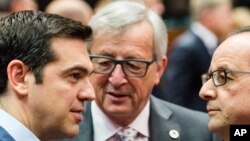Skeptical European leaders struggled on Sunday to reach an accord with debt-wracked Greece over its latest austerity plan, voicing doubts that Athens would live up to its promises to cut spending and increase taxes.
The heads of the 19 nations in Europe's euro currency bloc are considering a pledge by Greek Prime Minister Alexis Tsipras to impose another $12 billion in new taxes and spending cuts, in exchange for approving Greece's third bailout in five years, a three-year $60 billion loan.
As she arrived in Brussels for a eurozone summit on the Greek crisis, German Chancellor Angela Merkel declared, "There will not be an agreement at all costs."
Merkel, Europe's chief advocate for tough financial controls in Athens, said that during months of economic decline in Greece, "the most important currency got lost, and this is trust and reliability."
The eurozone finance ministers discussed the Greek plan for hours over two days before handing the debate over to the chiefs of state. Dutch Finance Minister Jeroen Dijsselbloem said the officials had "come a long way, solved a lot of issues," but that key parts of a possible deal remained unresolved.
As part of the negotiations, the Greek government has agreed to enact a series of spending reforms by Wednesday.
'Difficult junction'
Tsipras said he is ready for a compromise.
"We owe that to the peoples of Europe who want Europe united and not divided,'' he said. "We can reach an agreement tonight if all parties want it.''
Eurozone officials are grappling with Greece's failure to meet last month's $1.8 billion loan repayment to the International Monetary Fund, even as its banks are running out of cash and have imposed 60-euro-a-day ($67) withdrawal limits on depositors. The international creditors are seeking additional assurances that Athens will honor terms of any new deal.
"Well, it is a very difficult junction, a very difficult junction because we are faced with many different problems - sustainability issues, financial needs - and at the same time short-term issues," said Luxembourg Finance Minister Pierre Gramegna. "So we must sort out the short-term issues and the long-term issues and that's what makes it very difficult to find a global compromise."
Sources say the finance ministers used a Saturday meeting to formulate demands for additional Greek budget and political reforms before they actually open negotiations on any new loans.
German Finance Minister Wolfgang Schaeuble, whose country is Greece's biggest creditor, maintained a hard line.
“We will definitely not be able to rely on promises,” he said. “We are determined to not make calculations that everyone knows one cannot believe in.”
Lisa Bryant contributed to this report from Paris.






